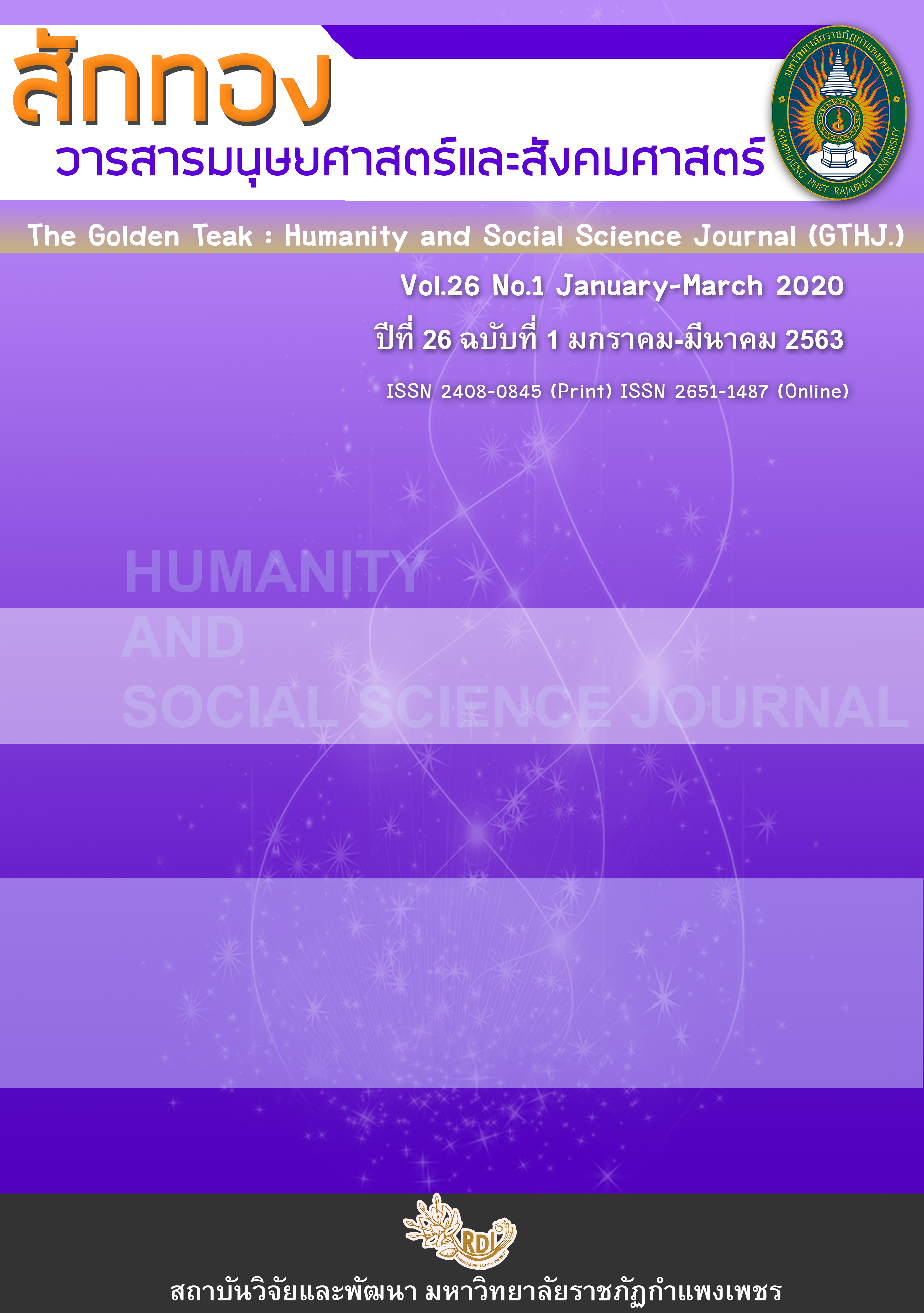The Model Development of Health Promotion Based on Upper Secondary School Students under the Secondary Educational Service Area Office 2 in Bangkok
Main Article Content
Abstract
This research was a quasi experimental research aimed to develop health promotion activity model. The purpose was to study the result of using health promotion model for upper secondary school students under the secondary educational service area office 2 in Bangkok. The samples were grade 10 students in the first semester of the academic year 2018 of Nawaminthrachinuthit Triamudomsuksanomklao school. They were divided into 2 groups, 45 students each. One group for experimental group and the other one was the comparison group. The experiment was designed by experimental group and comparison group using Nonequivalent Control Groups. Instrument tools used in this research are health promotion activities for upper secondary school students which consisted of 6 activities as following: 1) Health-loving people daring to change; 2) Self-reliant activities; 3) Volunteer activities; 4) Learning activities; 5) Health exhibition activities and 6) Health promotion guidance activities. The data were analyzed by frequency, percentage, mean (x), standard deviation (S.D.), and t-test mean difference. The research found that: 1. Health promotion model for upper secondary school students under the secondary educational service area office 2 in Bangkok consisted of 6 activities. The evaluation showed that health promotion model for upper secondary school students has passed the quality examination by expert. The Index of Congruency (I.O.C.) was 1.00 2. After using The health promotion model for upper secondary school students under the secondary educational service area office 2 in Bangkok the experimental group had a significantly developed mean score of physical, psychological, social health behaviors, and health knowledge compared the control group (p<0.05).
Article Details
บทความที่ได้รับการตีพิมพ์เป็นลิขสิทธิ์ของวารสาร สักทอง : วารสารมนุษยศาสตร์และสังคมศาสตร์ สถาบันวิจัยและพัฒนา มหาวิทยาลับราชภัฏกำแพงเพชร
ข้อคิดเห็นใดๆ ที่ปรากฎในวารสารเป็นวรรณกรรมของผู้เขียนโดยเฉพาะ ซึ่งมหาวิทยาลัยราชภัฏกำแพงเพชรและบรรณาธิการไม่จำเป็นต้องเห็นด้วย
References
behaviors of high school students. At the end of school, Nonthaburi Nonthaburi.
Journal of Social Science and Humanities Kasetsart University, 40(1), 69-84.
Department of Health, Ministry of Public Health. (2015). Health Promotion School Operation
Manual 2015. Nonthaburi : Department of Health Promotion, Ministry of Public
Health.
_______. (2016). Strategic Plan for Health Promotion and Health Promotion Environment
according to National Health Development Plan During the National Economic
and Social Development Plan No. 12 (2017-2021). Bangkok : Department of
Health, Ministry of Public Health.
Lister-Sharp, D., et al. (1999). Health Promoting School and Health Promotion in School : Two
Systematic Reviews. Health Technology Assessment, 3(22).
Meejun, K. (2009). Development of health promotion model in health promotion
schools. Ph.D. thesis Burapa University.
Pender., et al. (2006). Health Promotion in Nursing Practice. (5 th ed.). New Jersey :
Pearson Education, Inc.
Phunkham, Y., et al. (2010). The study to promote youth health and prevention of
risk behaviors and health problems among youths. Bangkok : Bureau of
Reproductive Health, Department of Health, Ministry of Public Health
Phuphaibul, et al. (2003). Family participation in health promotion. RTG/WHO. Report.
World Health Organization. (1986). Ottawa Charter for Health Promotion. Geneva :
WHO.
Piyaramwong, P. (2014). Health education program management using the health belief
model to prevent alcohol drinking of lower secondary school female students. Master Thesis in Health Education and Physical Education Chulalongkorn University.
praditSukthavorn, P. (2017). Health and Physical Education [Online]. Available :
http://taamkru.com/en/Health and Physical Education/ [2017, November 11].
Teravechcharoenchai. S. (1999). Health for life. (2nd Edition). Bangkok : Kasetsart University.
Yammen, P. & Duangsong, R. (2012). The effect of health promotion program by application
of health belief model and social support on behavioral modification for weight
control among overweight students at level 5 of primary school, Muang district,
Phitsanulok province. Journal of Research, 12(1), 57-67.
Wattanaburanon, A. (2005). Learning Management for Health Promotion in Schools.
Bangkok : Center for Textbooks and Academic Documents, Faculty of Education,
Chulalongkorn University.
World Health Organization. (2013). Major developments in health promotion. (Translated
from Milestones in Health Promotion : Statements from global conferences by
Sinsakchon Aunprom-Me). Bangkok : Thana Place.
World Health Organization. (1986). Ottawa Charter for Health Promotion. Geneva : WHO.


